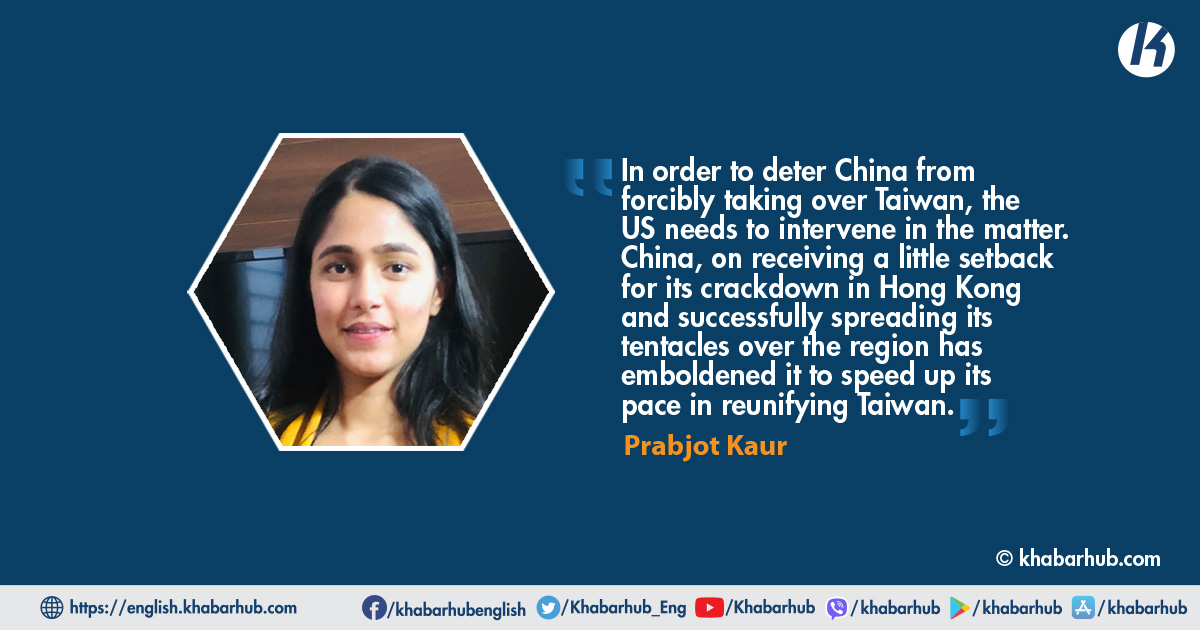Questions about Taiwan’s status have been fueling tensions among Taiwan and China and the United States (US). The long-standing conflict between Taiwan and China is certainly making China short of patience now when it’s aspiring to grow its sphere of influence.
Taiwan with its outstanding performance of successfully implementing democracy in the island and free and fair elections to elect the self-governing officials has inculcated in them a distinct ‘Taiwanese’ identity which is certainly an impediment to PRC’s ‘One-China’ principle and hence, it might use iron fist in tackling the incompliance of Taiwanese government.
On the other hand, China’s ambitions to take over the dominant position in the world have become a contentious issue in the political sphere of American diplomacy.
So, when China has been explicit in its determination to forcefully reunify Taiwan, the role of the United States would be interesting to gauge when the past lessons had dictated that the United States could permit no single hostile power to dominate the Asia Pacific.
In recent times, when China is capacitated to challenge the global dominance of the United States, the foreign policy of the US is converged more towards counter-balancing China’s influence in its region.
The inflection point in the cross-strait relations arose with the election of Tsai Ing-wen of the Democratic Progressive Party (DPP) in 2016. DPP is known for its crusade against China’s aim of reunifying Taiwan and has been outrightly calling for the independence of Taiwan.
Though President Tsai has been prudent enough to not explicitly go against China in order to stall any direct conflict. Even after China’s objections, the US strengthened ties with Taiwan and showcased pro-Taiwan stance, under President Trump.
The military tensions would even constraint China in exerting military assertiveness in the South China sea. Hence, the Strait rapprochement had helped China to settle its territorial disputes elsewhere.
The US has been aiding Taiwan with military assistance by selling more than $18 billion worth of arms and for setting up its de-facto embassy in Taipei worth $250 million.
The major breakthrough in Washington’s and Taipei’s unofficial relationship has been when Tsai talked to President-elect Trump on the telephone, the highest level of contact since 1979, and secondly, the passing of the Taiwan Travel Act (TTA) with unanimous consent in the US senate in 2018, which allows high-level officials of the US to visit Taiwan and vice versa.
After struggling with sullen relations with Trump, China seemed to harbor unrealistic expectations in the Democrat Joe Biden.
But to China’s chagrin, the Biden administration didn’t reverse the policy towards Taiwan. In fact, Biden was also the first US president to have invited Taiwanese representatives to attend the Presidential inauguration.
He has even emphasized the US’s ‘rock solid’ commitment towards Taiwan in a joint statement with Japan, South Korea, the European Union and the G7.
The US has long opposed the emergence of any other state as the potential hegemon and hence sees the rise of China as a direct threat and is determined to contain the country’s rise. Hence, Taiwan with the escalating gestures for support from the US has become a subset object at the prey of greater geopolitical forces.
The national interests of the US drive its involvement in any conflict but what particular interests are at stake for the US for it to keep supporting Taiwan? What if the US loses Taiwan to China?
First, at the strategic level, the US has assessed that remaining true to the cause of Taiwan would help the US in maintaining its credibility in the East Asia region.
The US holds the beacon of security guarantor in the region and maintains a considerable balance of power through its military presence and alliances.
Hence, should the US abandon Taiwan to China, either explicitly or for its long-held commitment against using coercive measures in tackling the conflict, its allies like South Korea and Japan would seriously question the resoluteness of the US towards its regional commitments, in the face of rising China.
In order to deter China from forcibly taking over Taiwan, the US needs to intervene in the matter. China, on receiving a little setback for its crackdown in Hong Kong and successfully spreading its tentacles over the region has emboldened it to speed up its pace in reunifying Taiwan.
Hence, the sense of security in the region that hinges on the presence of a great power like the US will be undermined, posing a serious threat to its influence in the region.
Secondly, communist China’s concrete mixture of military prowess, economic strength and never-ending ambitions pose an apt counter to the West-led liberal order.
This would set an unfavorable precedent that democratic principles and open markets are not prerequisites for any country to achieve economic growth.
The ideological divide is prevalent in the US-PRC competition. This way, China’s victory implicitly brings the US at loss.
Therefore, the policymakers while assessing the US-PRC-Taiwan nexus should not disregard the ideological factor. As Shelley Rigger says, “Americans have a tendency in their behavior to support underdogs, considering it necessary to protect democracies in the world.”
Thirdly, over a decade Taiwan has invested heavily in developing its acumen in manufacturing computer chips, particularly, the Taiwan Semiconductor Manufacturing Company (TSMC) which has a 90% share in the development of the high-end chips which are going to be utilized in bringing a fourth industrial revolution.
Hence, it would be safe to say that the world technological economy is dependent on Taiwan. As per the essay by Steve Blank, if PRC succeeds in bringing Taiwan into its fold, China may resort to options short of war like it can coerce the company to stop making chips for export in the United States.
This might bring the civilian and electronics industry of the US to a major setback by five years. It won’t be wrong to say that controlling modern chip industries in today’s age is like controlling the oil supply in the 20th century.
Nevertheless, Taiwan with its advanced capability of manufacturing chips can prove to be a casus-belli for both the economic giants and this risk cannot be downplayed by the United States.
Lastly, the role of the US in the cross-strait situation would be decisive for the future of the hegemonic status it holds across the globe. The world will witness how the US handles the cross-strait relations and how it will manage the challenges in concomitance with rising China.
On losing to China, the US will give license to China to engage in conflicts the way it aspires to and also, might give an indication to the other countries about the shift in the regional power, specifically global power which in turn might shift their interests and strategic choices towards China, leaving the US in a weak position in the region.
The reasons stated are enough for the United States to defend Taiwan from being overpowered and suppressed by China.
In order to deter China from forcibly taking over Taiwan, the US needs to intervene in the matter. China, on receiving a little setback for its crackdown in Hong Kong and successfully spreading its tentacles over the region has emboldened it to speed up its pace in reunifying Taiwan.
It’s time the US start introducing ‘strategic clarity’ in their position with respect to Taiwan and China. That said, mere, strategic clarity is not a silver bullet, the US needs to invest heavily in its military capabilities to enable the defense of Taiwan, complementing it with military upgrades in Guam, improving surveillance and reconnaissance assets in the region.
This would not only alert China but also signal the economic and political costs it has to suffer if it resorted to military means.
Historically, uncertainty regarding the intention and purpose of the other state actors have been the major driver for the escalation of conflict and instability; World War I and the Korean War being the examples.
Thus, clarity reduces the risk of conflict since both sides get well aware of each other’s capabilities and military and economic prowess. Thus, clarity becomes an effective tool for deterrence.
Going at loggerheads in the cross-strait relations is not propitious for either China or the US. The lowering of the military tensions in the region would help the People’s Liberation Army (PLA) gain extensive time for its force transformation and mass weapons proliferation.
To lessen the adversity of the reality, the US can start developing a roadmap of its foreign policy in a way that its strategic interests are not harmed substantially if the cross-strait relations undergo consequential change.
The military tensions would even constraint China in exerting military assertiveness in the South China sea. Hence, the Strait rapprochement had helped China to settle its territorial disputes elsewhere.
For the US, on the other hand, the current status quo has been hitting the right chords of its foreign policy.
For many think tanks in the US, if China is a growing power challenging the status of the US, the Taiwan card can be a politically and diplomatically effective tool to confine China as this card will expose China’s vulnerability. A successfully managed Taiwan card will maximize gains for the US.
However, not to deny, China will not sit back idle watching the US playing the card. The US should be ready to face the countermeasures exercised by China.
Clearly, the cost outweighs benefits for the US and it would not risk going into war and probably losing to China. On the other hand, losing it to the US, an economic juggernaut China will lose its influence in its own backyard, denting its regional and global ambitions.
Therefore, for now, the US can constructively feign the role of a mediator in maintaining peace in the cross-strait relations and in sustaining the status quo and deterring China from entering the battlefield.
As John Mearsheimer argues that if China continues to grow at an exponential rate, Taiwan will be doomed to be a part of China and the US would then have to say goodbye to Taiwan.
Though the abandonment of Taiwan is undesirable for strategic reasons, it’s the bitter reality of the geopolitics that the US has to ultimately accept.
To lessen the adversity of the reality, the US can start developing a roadmap of its foreign policy in a way that its strategic interests are not harmed substantially if the cross-strait relations undergo consequential change.
(PRC and China are used interchangeably. ROC and Taiwan are used interchangeably)









Comment